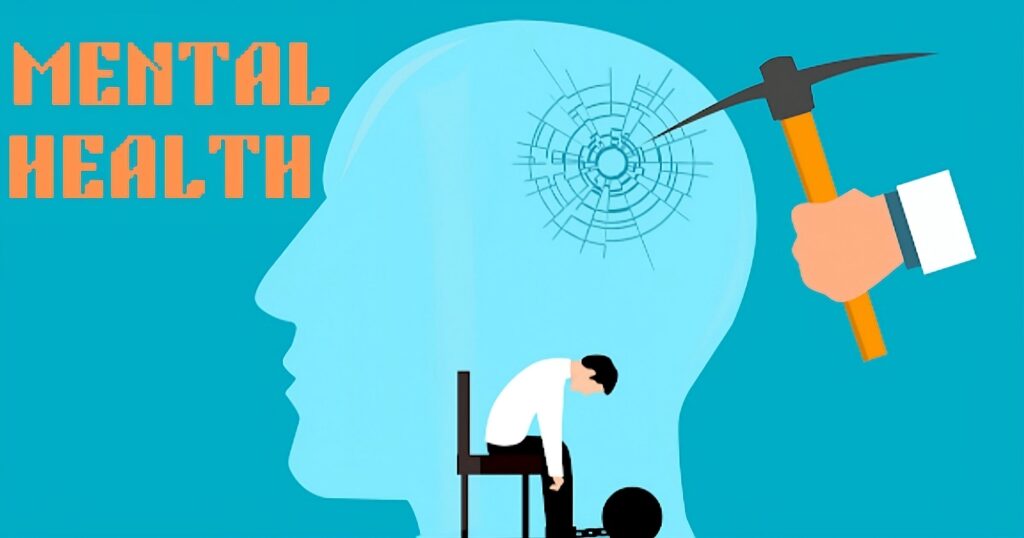MENTAL HEALTH
Mental health is a vital aspect of overall well-being, and it encompasses a range of factors related to emotional, psychological, and social well-being. Mental health issues can affect anyone, regardless of age, gender, race, or socioeconomic status. It’s important to understand what mental health is, how it can be affected by various factors, and what steps can be taken to maintain or improve it.
Mental health is a state of emotional and psychological well-being, where an individual is able to cope with the daily stresses of life, build healthy relationships, and function effectively in their daily activities. Good mental health is not just the absence of mental illness but also involves the presence of positive emotional experiences and the ability to manage negative emotions effectively.

Factors That Can Impact Mental Health
There are several factors that can impact mental health. Genetics, life experiences, and environmental factors can all play a role in an individual’s mental health status. For example, individuals with a family history of mental illness may be at a higher risk of developing mental health issues themselves. Traumatic experiences, such as abuse or neglect, can also impact mental health and increase the risk of developing mental health disorders.
In addition to these individual factors, societal and environmental factors can also impact mental health. For example, poverty, discrimination, and stigma can all contribute to poor mental health outcomes. Social support, access to healthcare, and community resources can all promote good mental health.
Mental Disorders
Mental health issues can range from mild to severe, and can include conditions like anxiety disorders, depression, bipolar disorder, and schizophrenia. These conditions can have a significant impact on an individual’s ability to function in their daily life, build and maintain relationships, and perform in their academic or professional roles. However, with proper diagnosis and treatment, many individuals with mental health issues are able to manage their symptoms and lead fulfilling lives.
Mental Health Management
One important aspect of maintaining good mental health is self-care. Self-care includes activities and behaviors that promote well-being and reduce stress levels. This can include things like exercise, healthy eating, getting enough sleep, and engaging in hobbies or activities that bring joy and fulfillment. Self-care can also involve setting boundaries, saying “no” to commitments that are too demanding, and prioritizing time for rest and relaxation.
In addition to self-care, seeking professional help is also important for managing mental health issues. This can include talking to a primary care physician, a mental health professional like a therapist or counselor, or a psychiatrist who can prescribe medication if needed. It’s important to seek help if you’re experiencing symptoms of mental illness, such as changes in mood, sleep, or appetite, feelings of hopelessness or despair, or difficulty functioning in daily activities.
There are also various resources available to support individuals with mental health issues. Support groups, community resources, and online forums can all provide a sense of connection and support for those who are struggling with mental health issues. It’s important to remember that you are not alone, and that there is help available.
It’s also important to address stigma and discrimination surrounding mental health issues. Stigma can prevent individuals from seeking help and can contribute to feelings of shame and isolation. By promoting awareness and understanding of mental health issues, we can reduce the negative impact of stigma and create a more supportive and accepting society for all.
Conclusion
In conclusion, mental health is a vital aspect of overall well-being, and it can be impacted by a range of factors including genetics, life experiences, and environmental factors. It’s important to prioritize self-care and seek professional help if needed to maintain good mental health. By addressing stigma and promoting awareness and understanding of mental health issues, we can create a more supportive and accepting society for all. Remember, you are not alone, and help is available.
Frequently Asked Questions:
What is mental health?
Mental health refers to our emotional, psychological, and social well-being. It affects how we think, feel, and act, as well as how we handle stress, relate to others, and make choices. Mental health is important at every stage of life, from childhood and adolescence through adulthood.
What are common mental health disorders?
Common mental health disorders include:
Depression: Persistent feelings of sadness, loss of interest, and other emotional and physical problems.
Anxiety Disorders: Intense, excessive, and prolonged worry and fear about everyday situations.
Bipolar Disorder: Extreme mood swings that include emotional highs (mania or hypomania) and lows (depression).
Schizophrenia: A severe mental disorder characterized by distorted thinking, perceptions, emotions, language, sense of self, and behavior.
Post-Traumatic Stress Disorder (PTSD): A condition triggered by experiencing or witnessing a traumatic event.
Obsessive-Compulsive Disorder (OCD): Persistent, unwanted thoughts (obsessions) and repetitive behaviors (compulsions).
What are the symptoms of mental health disorders?
Symptoms vary depending on the disorder but may include:
Changes in mood: Persistent sadness, anxiety, or irritability.
Changes in behavior: Withdrawal from friends and activities, significant changes in eating or sleeping patterns.
Physical symptoms: Unexplained aches and pains, fatigue.
Cognitive symptoms: Difficulty concentrating, memory problems, or confusion.
Perceptual symptoms: Hearing voices or seeing things that aren’t there (in severe cases).
What causes mental health disorders?
The causes of mental health disorders are complex and can include a combination of:
Biological factors: Genetics, brain chemistry, and physical health conditions.
Psychological factors: Trauma, abuse, and neglect.
Environmental factors: Life experiences, such as significant stress or loss, and socio-economic status.
How can mental health disorders be treated?
Treatment for mental health disorders often includes a combination of:
Psychotherapy: Various forms of counseling, such as cognitive-behavioral therapy (CBT), talk therapy, or other therapeutic approaches.
Medications: Antidepressants, anti-anxiety medications, antipsychotics, mood stabilizers, and other drugs.
Lifestyle changes: Regular exercise, a healthy diet, adequate sleep, and stress management techniques.
Support groups: Peer support and community resources.
Can mental health disorders be prevented?
While not all mental health disorders can be prevented, some strategies can help reduce the risk:
Early intervention: Identifying and addressing early signs of mental health issues.
Stress management: Learning and practicing techniques to manage stress effectively.
Healthy lifestyle: Maintaining a balanced diet, regular exercise, and sufficient sleep.
Support networks: Building strong relationships with friends and family.
How can I help a loved one with a mental health disorder?
Supporting a loved one with a mental health disorder involves:
Educating yourself: Learning about their specific condition and its symptoms.
Being there: Offering emotional support and understanding.
Encouraging treatment: Suggesting they seek professional help and supporting them in their treatment journey.
Being patient: Recovery can take time, and setbacks are possible.
Taking care of yourself: Ensuring you also have support and practice self-care.
How do I know if I need professional help for my mental health?
Consider seeking professional help if you:
Feel overwhelmed: Persistent feelings of sadness, anxiety, or hopelessness.
Struggle with daily tasks: Difficulty functioning at work, school, or in personal life.
Experience severe symptoms: Suicidal thoughts, self-harm, or hallucinations.
Notice significant changes: Drastic changes in behavior, mood, or energy levels.
What should I expect during a mental health assessment?
A mental health assessment typically involves:
An interview: Discuss your symptoms, thoughts, feelings, and behavior with a mental health professional.
Questionnaires: Completing standardized questionnaires to assess your mental health.
Physical examination: Ruling out physical health conditions that might be causing symptoms.
Diagnosis: Receiving a diagnosis based on the assessment and discussion of treatment options.
How can I reduce the stigma associated with mental health?
Reducing stigma involves:
Education: Learning and spreading accurate information about mental health.
Open conversation: Talking openly about mental health and encouraging others to do the same.
Empathy: Showing understanding and compassion for those with mental health issues.
Support: Advocating for mental health resources and supporting mental health initiatives.
READ MORE:
I hope this article is helpful to you.

.png)






Very interesting information!Perfect just what I was looking for!Leadership
Thank you for reading! If you enjoyed this content, please subscribe to my blog to stay updated with the latest posts and insights. Your support is greatly appreciated!
I like this blog it’s a master piece! Glad I detected this ohttps://69v.topn google.Raise blog range
Thank you for reading! If you enjoyed this content, please subscribe to my blog to stay updated with the latest posts and insights. Your support is greatly appreciated!